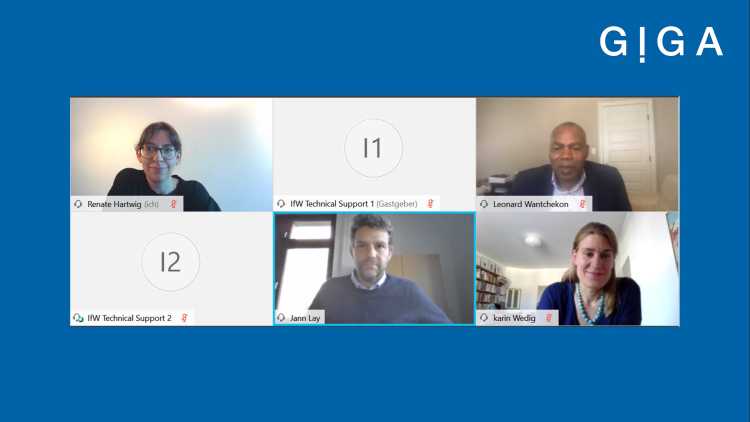- Startseite
- Forschung & Transfer
- Forschungsprojekte
- Research Support to the Special Initiative “Decent Work for a Just Transition“
Forschungsunterstützung für die Sonderinitiative „Gute Beschäftigung für sozial gerechten Wandel“ (RéUsSITE)
With the African population expected to double by 2050, 20 million new jobs are needed annually. The increasing importance of employment creation led the German Ministry for Economic Cooperation and Development (BMZ) to establish the Special Initiative “Decent Work for a Just Transition“. The GIGA offers research support and advice to this initiative.
BMZ, 2019-2023
Team
Leitung
Koordinator:in

Forschungsfragen
The research project supports the BMZ and the implementing institutions by investigating the effects of important representative approaches used in the SI Decent Work, and in providing research-backed recommendations geared towards optimising the various policy measures over the course of the project if necessary.
The project adresses the following research questions:
- How effective are the policy measures of the SI Decent Work in creating training opportunities and permanent jobs, and in improving incomes and working conditions?
- How exactly do these measures work, which (project- or context-specific) factors reduce or promote these effects? Could a better interaction between the various instruments of the SI Decent Work increase its impact?
- Which recommendations can be derived from the research results for the BMZ, the implementing institutions, other development cooperation organisations as well as national governments and other organisations on the ground?
Beitrag zu internationaler Forschung
The RéUsSITE project advances international research in multiple ways. First, it contributes to a growing body of rigorous evidence on the employment effects of different types of labour market interventions, which is scarce especially in African contexts. Second, it aims to improve the data basis on foreign direct investment in selected African countries and associated investment promotion measures, thereby enabling research on the effectiveness of these measures. Third, it provides evidence on the effectiveness of policy approaches combining private investment with training and employment.
Forschungsdesign und Methoden
Work Package 1: Rigorous measurement of the impact of SI Decent Work measures on labour market outcomes of beneficiaries
In this work package, the employment effects of multiple measures of the SI Decent Wok are analysed by means of rigorous impact evaluations (RIE). The first step was to identify measure suitable for impact evaluations, which was a collaborative process with BMZ and the Implementing Organisations.
Work Package 2: Assessment of the effects of SI Decent Work support measures at the level of investment projects
In the second work package, the effects of the SI Decent Work measures on the success of investment projects will be examined with regard to (1) their actual implementation, (2) the mobilisation of foreign and domestic capital, (3) the creation of employment and its quality, as well as (4) the links to the local economy, if applicable. The work package applies a mixed-methods approach: On the one hand, the connections between investment promotion measures and project success are to be quantitatively examined on the basis of a database on investment projects to be created. On the other hand, these quantitative studies are supplemented by qualitative case studies of individual funding measures or investment projects. Both approaches serve to compare the effectiveness of different investment promotion approaches in different contexts (countries, regions or even sectors). In this work package, particular importance is attached to the question of a counterfactual scenario, which cannot be so easily established by a randomized experiment: If an investment project had not existed, would it have been implemented just as quickly, to the same extent and in the same form? In other words: (How) did the measure contribute to the implementation of the investment project in this way? The planned analyses are also based on a written review of the available evidence.
Vorläufige Ergebnisse
WP1: Projects for the evaluation of SI measures have been selected and the baseline survey of the first project in Ghana has been conducted. WP2: Identified knowledge gaps range from basic facts about FDI prevalence in Africa to the lack of information on the impact of FDI on employment outcomes and the effects of investment promotion measures on investment decisions. A newly assembled greenfield FDI projects data base provides the basis for further investigation. These data will allow us to analyze the direct employment effects of FDI as well as to examine the effectiveness of investment promotion measures.
















